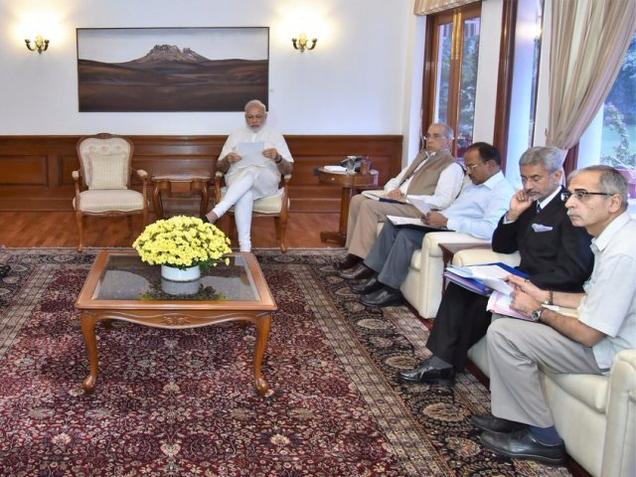In the last couple of weeks, Modi has sent very confusing signals about the Pakistan. On one hand, Modi has challenged Pakistan to fight poverty together and has asked citizens to study more in response to Pakistan’s terror attack in Uri while on the other hand, his team has relentlessly hammered Pakistan at UNGA. Undoubtedly, it has disillusioned the whole country.
However, as the most offensive measure post-Uri attack, PM Modi convened a meeting on Monday to review the Indus water treaty. This meeting was a build up to an earlier statement of the MEA that asked for reviewing the treaty. The meeting was attended by the National Security Advisor Ajit Doval and Foreign Secretary S Jaishankar along with several other bureaucrats. Even though the govt took a conscious call of not abrogating the treaty immediately it gave ample hints of tightening the noose around the Indus water. As expected the bare mention of utilizing the western waters left Pakistan gasping with its media calling it an act of war.
Indus water treaty, inked by Jawahar Lal Nehru and Md Ayub Khan and brokered by the World Bank, is a half a decade old river water sharing agreement between the two nations. The treaty allocated 80 % water of the whole Indus water system to Pakistan leaving only 20 % water to India for its usage. The gross inequality in the distribution of water makes it one of the most favorable water distribution agreement for a lower riparian country, in this case, Pakistan, in the world. India has dutifully adhered to the Indus water treaty since 1960.
For the first time in recent weeks, Modi’s statement complimented his words. In a direct reference to the Indus water and Pak-sponsored terrorism, Modi told that the blood and water can’t flow together and asked the officials to do everything possible under the ambit of the Indus water treaty to unsettle Pakistan.
The outcome of the meeting listed three main action points i.e maximizing the utilization of western rivers, restarting of the abandoned Tulbul (alternatively called Wullar) project and immediate deferral of the meeting of Indus water commission. The impact of each of these measures will be explained in subsequent paragraphs.
To say the least, the western rivers Jhelum, Chenab and Indus proper are the lifelines of Pakistan. Apart from the agriculture-centric economy, more than 50 % of the Pakistan’s workforce is engaged in farming. Due to an acute water shortage and dismal rainfall, 93 % of the irrigation of Pakistan plains are dependent on western rivers of Indus water system. Moreover, in last few decades owing to climate change and change in river flow pattern, there is a significant reduction in the flow of these Wester Rivers. It has caused an acute shortage of per Capita water availability in Pakistan which has now gone down an alarming level of less than 1500 cubic meters. Any alteration in the release of these waters will magnify the stress manifold. As per annexure C of the Indus water treaty, India is allowed to utilize these waters for non -consumptive usage such as generation of hydropower. In addition to the western waters, at least 2-3 MAF of unallocated eastern waters flow to Pakistan due to the lack of Infrastructure and poor maintenance on India’s part. India’s call to maximize the utilization of its allocated water will reduce the release of water to Pakistan which may probably lower the per capita availability of water to below 1000 cubic meter.
Insecurity of Pakistan was written all over in 1960 treaty when it asked for 6 months prior information of each of the project which India would plan to develop in surrounding areas. The 21-page treaty further goes in detail and lists the required documents to be submitted to Pakistan including the civil drawings. One of the interesting case in this regard was the Ballighar dam project. Unconvinced by the India’s design and refuting the advancement of technology since the treaty, Pakistan rushed to World Bank to halt the project. The World Bank appointed Neutral Expert, confirmed India’s design of ensuring reservoir as the most appropriate technique and allayed Pakistan’s apprehensions. The Wullar project which was abandoned in 1987 due to severe objections by Pakistan can be built on the basis of the guidelines cited by the Neutral Expert in the reference of Balligarh project and Pakistan can do very little about it. Moreover, the structure will be used to maintain 4.5ft draught in Jhelum which is also within the maximum allowed 3.6MAF storage on the western water. This project alone can cause a huge level of variance to the release of water to Pakistan in the case of war.
Last but not the least, the suspension of Indus commission meeting has stopped the formal channel of Pakistan’s grievance redressal. Now Pakistan can only go to World Bank or the UN for any issue related to the treaty. India can always rebuke Pakistan’s claim of non-compliance of Indus Water Treaty, as Pakistan does for cross-border terrorism. Moreover, India can also deny the entry of third-party observer as it does in Kashmir which may unofficially scrap the Indus water treaty.
Water is a commodity just like oil. If oil can be traded why not water? As per Independent International experts, India’s share of Indus water should be between 40-45 %. To be fairer to the generation to come, India should ask Pakistan for the price of any excess water if Pakistan wants the Indus water treaty to exist. It is interesting to note how much China can bear the cost on his ally’s behalf.
